Europe boosts cross-border cancer research
Networking and working jointly across borders are already intrinsic parts of cutting-edge research in Europe and abroad. Few scientists need encouragement to form alliances with colleagues in other countries. And, more and more scientists choose excellence over geography in seeking out partnerships. In Europe, a major step forward in cross-border cancer research has been taken with the recent launch of EUROCANPLATFORM ('A European platform for translational cancer research'), an EU-funded project aiming to streamline all aspects of cancer research in Europe - from basic research to preclinical and clinical trials. EUROCANPLATFORM has received EUR 12 million under the Health Theme of the EU's Seventh Framework Programme (FP7). This Network of Excellence brings together 28 of Europe's most research-intensive institutions in the field of cancer. Cancer research in European institutions has the potential to make a difference as it has a number of unique strengths, namely a strong foundation in biomedical science and infrastructures that span from patient registries to bioinformatics. But it has often been criticised for being fragmented with insufficient collaboration between research key players. Professor Ulrik Ringborg at the Karolinska Institutet in Sweden, who is coordinating the project, comments: 'In a way, you could say that this initiative represents a paradigm shift in cancer research. The project will last for five years, establishing a collaborative structure within the EU for cancer research.' Despite the spectacular progress in cancer research, the annual incidence of cancer continues to rise, mainly because of an ageing population. Nonetheless, part of this increase is unrelated to the age of the population. Cancer is a complex disease caused by interactions of multiple factors including ageing, lifestyle influences and genetic predisposition. In the past years, we have witnessed a dramatic progress in understanding the molecular mechanisms at work in the transformation of a normal cell into a cancer cell. Yet, our knowledge is far from complete. There are still many unresolved questions regarding diagnosis and treatment. Furthermore, we lack the critical mass required to rapidly implement new discoveries in a clinical setting. 'An important part of the project involves getting the right therapy to the right patient at the right time,' says Professor Ringborg. Through advanced studies of DNA [deoxyribonucleic acid] alterations and expressions of RNAs (ribonucleic acid) and proteins on tumour and healthy tissues, the EUROCANPLATFORM project is expected to open up new possibilities for validating the tumour response to treatments. Professor Ringborg concludes: 'But before we can get there, we need to do a great deal of research since the range of possible tumours and therapies is vast. No one research centre can have the resources needed. We must make sure that we coordinate and exploit the resources we have to the full. The ultimate winners will be the patients, the public and the healthcare services.' The EUROCANPLATFORM consist of experts from Belgium, Denmark, France, Germany, Hungary, Italy, the Netherlands, Norway, Spain, Switzerland and the UK. For more information, please visit: Karolinska Institutet: http://ki.se/?l=en(opens in new window) EUROCANPLATFORM project factsheet on CORDIS, click: here
Countries
Sweden



